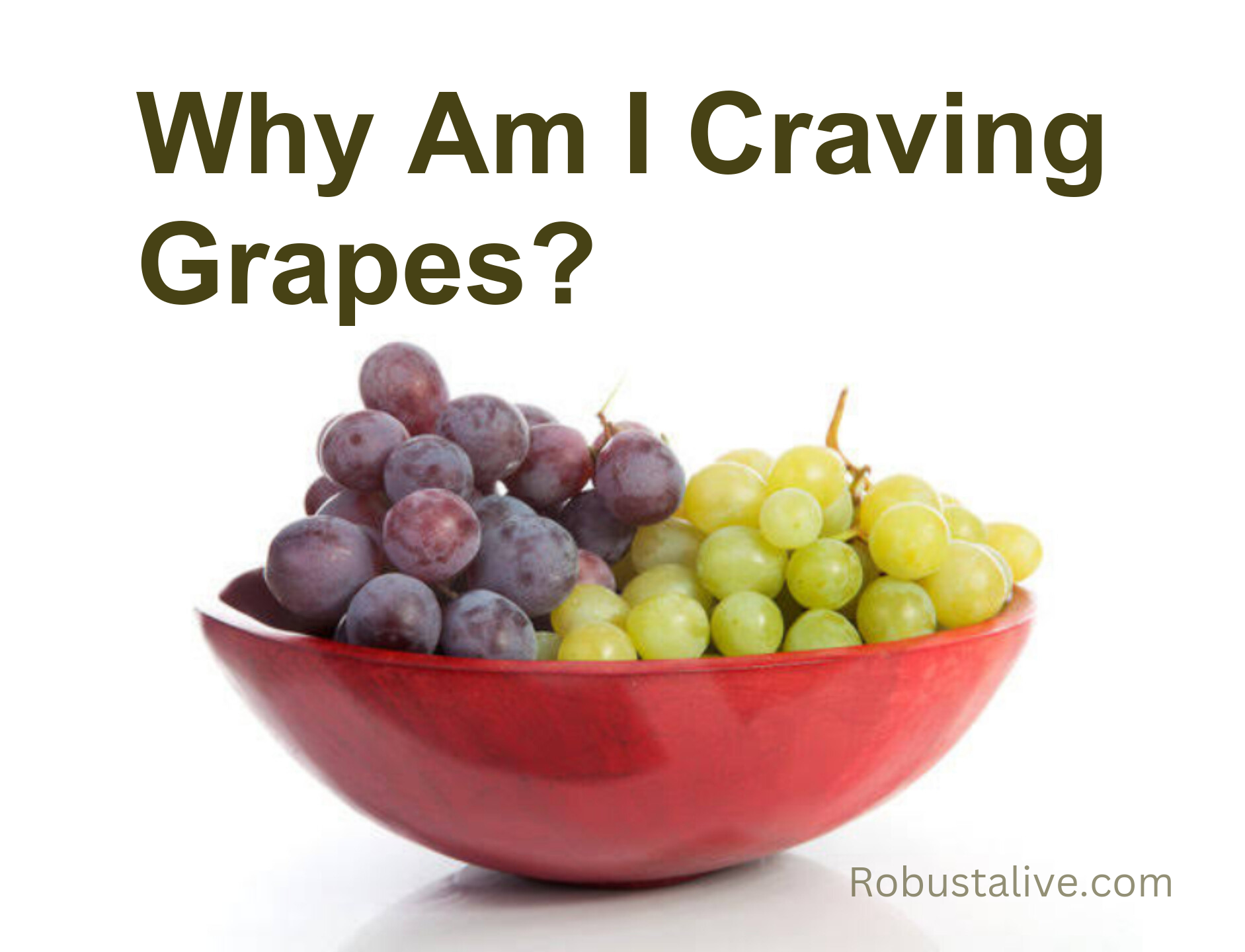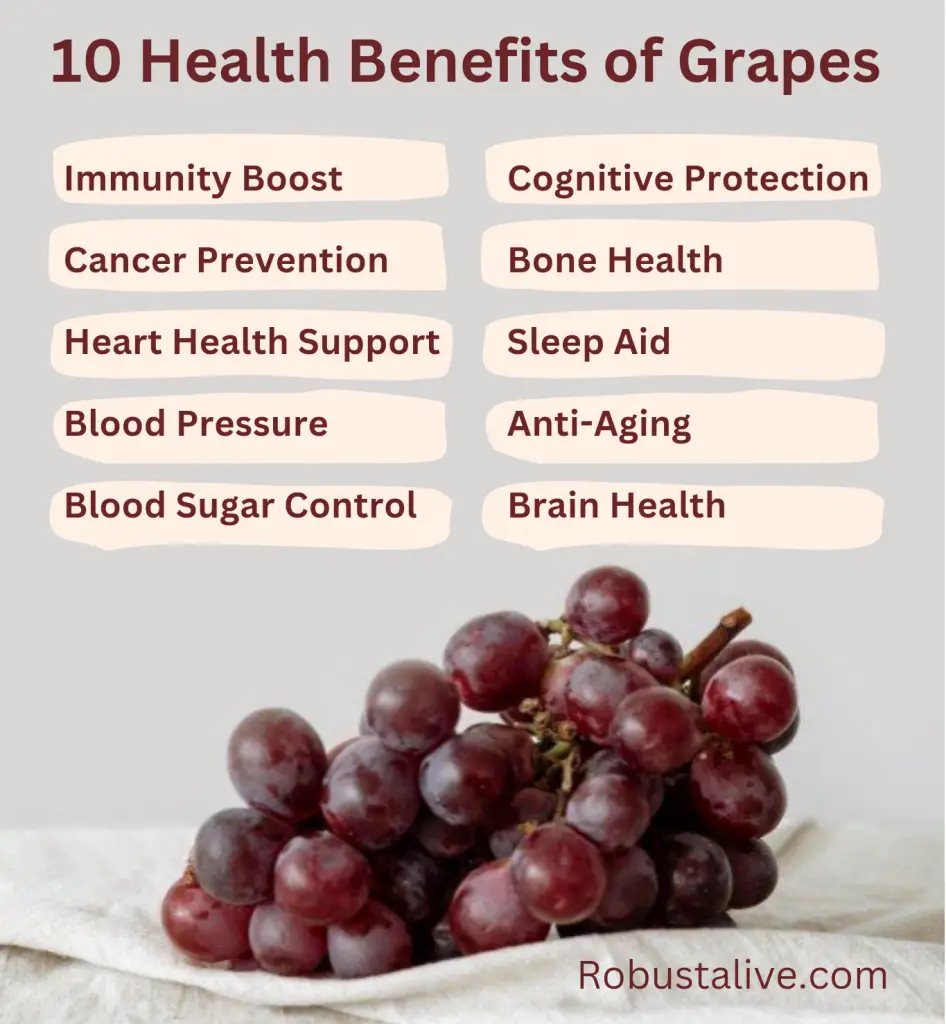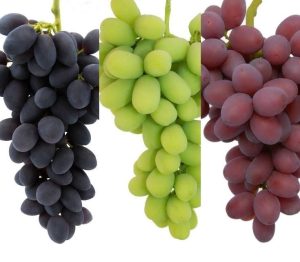Why Am I Craving Grapes?

Are you finding yourself suddenly longing for a bunch of juicy grapes? Don’t worry; you’re not alone! Cravings for specific foods can be a common and intriguing occurrence.
So, why am I craving grapes?
Craving grapes or grape juice could signal a nutritional deficiency, sweet tooth, dehydration, or even emotional comfort. During pregnancy, hormonal changes can influence taste preferences and signal a need for specific nutrients found in grapes. In moderation, considering their sugar content, around 8 to 10 grapes a day are recommended for their benefits.
This article will comprehensively explore the reasons behind your grape cravings. Keep scrolling!
Why Am I Craving Grapes?
When you find yourself strongly craving grapes or grape juice, there’s often a specific underlying reason driving that desire. Let’s take a closer look at what is causing your strong urge to eat grapes.
You Have Nutritional Deficiency
One of the primary reasons for craving grapes is the possibility of a nutritional deficiency. These small fruits are a nutritional powerhouse, containing essential vitamins and minerals which include:
- Vitamin C
- Vitamin K
- Potassium
- A range of antioxidants
When your body lacks these vital nutrients, it may manifest as a strong longing for grapes. For example, insufficient vitamin K levels can weaken your immune system and raise the risk of certain cancers.
Hence, your body might signal this deficiency through cravings for grapes, effectively bridging these nutritional gaps.
Craving For Something Sweet
Grapes are renowned for their natural sweetness, making them a healthy and appealing option for satisfying your sweet cravings. Natural sugars in grapes offer a delightful alternative to processed sugary snacks.
Moreover, the natural sugars in grapes provide a quick energy boost while supplying your body with essential nutrients, making them an ideal choice for those who seek a sweet treat with added health benefits.
You Are Dehydrated
Dehydration is a prevalent trigger for grape cravings. Grapes are remarkably rich in water content, comprising approximately 80-85%.
When your body lacks sufficient fluids, it may manifest this need through cravings for grapes.
Consuming grapes in such instances helps quench your thirst and effectively aids in rehydration, ensuring your body remains adequately hydrated throughout the day.

Psychological Comfort
Food often serves as a means of emotional comfort and stress relief. Being healthy and delicious, Grapes can offer solace and satisfaction during stressful times.
Eating grapes can elevate your mood and provide a sense of well-being.
Consequently, when you seek emotional comfort or experience stress, you may be irresistibly drawn to grapes.
Habitual Cravings
Habitual cravings can develop over time due to consistently incorporating grapes into your diet.
Your body can become accustomed to grapes’ taste, texture, and nutritional benefits, leading to regular cravings. This habitual aspect is strongly linked to the pleasure you derive from grapes, reinforcing the craving cycle.
Taste Preference and Unique Nutritional Value
Grapes provide numerous nutritional benefits, and interestingly, your preference for specific grape varieties can influence your cravings.
Take red grapes, for example. They are packed with antioxidants, particularly resveratrol, which can reduce inflammation and lower the risk of heart disease.
Why Am I Craving Grapes While Pregnant?
Your body experiences several changes while you are pregnant, including hormone changes. These alterations may cause a desire for new foods, such as grapes.
Your body may occasionally use desires as a signal that it needs certain vitamins and antioxidants, which are present in grapes.
Estrogen and progesterone can impact your taste buds and dietary preferences, influencing what you enjoy eating.
It is crucial to be aware of these hormonal influences and ensure you and your baby receive all the necessary nutrients by maintaining a well-balanced diet.
Nutritional Value Of Grapes
| Nutrient | Amount per 1 cup (151 grams) of Grapes |
| Calories | 104 |
| Carbohydrates | 27 grams |
| Protein | 1 gram |
| Fat | 0.2 grams |
| Fiber | 1.4 grams |
| Copper | 21% of the Daily Value (DV) |
| Vitamin K | 18% of the DV |
| Thiamine (Vitamin B1) | 9% of the DV |
| Riboflavin (Vitamin B2) | 8% of the DV |
| Vitamin B6 | 8% of the DV |
| Potassium | 6% of the DV |
| Vitamin C | 5% of the DV |
| Manganese | 5% of the DV |
| Vitamin E | 2% of the DV |
10 Health Benefits Of Eating Grapes

- Grapes are rich in vitamin C and natural antimicrobial properties, boosting immunity and fighting infections.
- Their antioxidants may help prevent cancer and reduce oxidative stress.
- Low in sodium and high in potassium, they support heart health.
- Resveratrol in grapes supports heart health by lowering blood pressure and preventing heart-related issues.
- With a low glycemic index, they help control blood sugar.
- Resveratrol in grapes may protect against cognitive disorders.
- Nutrients like vitamin K, calcium, and magnesium promote bone health.
- The melatonin in grapes aids in restful sleep and circadian rhythm regulation.
- Resveratrol may stimulate longevity genes, slowing down aging.
- They are hydrating and may help maintain brain health.
Is It OK To Eat A Lot Of Grapes?
While grapes are a tasty and healthy snack, overindulging can lead to a few potential drawbacks.
- Blood Sugar Spike: One concern is the spike in blood sugar levels that may occur due to their relatively high natural sugar content, specifically fructose. This can result in an excessive intake of calories if grapes are in large quantities.
- Diarrhea/Constipation: Grapes are high in natural sugar and insoluble fibers. Overconsumption can lead to loose stools or constipation, disrupting your digestive system.
- Abdominal Pain: Grapes’ undigested seeds can result discomfort in the abdomen and, in severe cases, facilitate conditions like appendicitis.
- Kidney Stones: Grapes contain a compound called oxalate, which can contribute to the formation of kidney stones in susceptible individuals when consumed excessively.
- Weight Gain: Despite being low in calories, overeating grapes can contribute to weight gain due to their natural sugar content. It is important to maintain moderation when enjoying this fruit.
- Allergies: Some individuals may have allergies to grapes. These allergies can manifest as red patches on the skin, headaches, vomiting, or even life-threatening anaphylactic reactions.
- Gastric Issues: Consuming grapes on an empty stomach can result in acidity and gastric discomfort, primarily due to the presence of salicylic acid. Gastric issues may arise as a consequence.
Some other side effects of grapes include:
- Bloating
- Cough
- Dry mouth
- Headache
How Many Grapes Can I Eat A Day?
Just as you I also wondered – why do I crave grapes and how many of them can I eat a day. Here is what I found out. As a general guideline, consuming around 8 to 10 grapes per day is recommended.
The United States Department of Agriculture (USDA) states that each serving is approximately equal to 1 cup, which consists of about 32 grapes.
However, it’s crucial to consider your overall diet and activity level. If you already maintain a healthy diet and engage in regular physical activity, consuming one serving (8 to 10 grapes) should suffice.
Nevertheless, if you have specific dietary requirements or concerns, it’s advisable to consult with a medical professional or registered dietitian.
It’s important to moderate your grape intake due to their relatively high sugar content, especially if you are attempting weight management or dealing with conditions such as diabetes.
Keep in mind that individual grape sizes can vary; therefore, employing standardized measurements like cups aids in determining your daily consumption more effectively.
Is It Possible To Be Addicted To Grapes?
No, it is not possible to be addicted to grapes in the same way people become addicted to substances like alcohol.
Although grapes can be a delightful and nutritious snack, they lack addictive components that trigger physical or psychological dependence.
Are Grapes High In Sugar?
Yes, grapes can contain a lot of sugar, particularly Cotton Candy Grapes, which have the largest amount—28 grams—per cup.
Red and green grapes both include 15 grams of sugar per cup, which is more than the notoriously high-sugar medium banana.

Source: Grapes from California
What Color Of Grapes Are The Healthiest?
Black and red grapes are considered the healthiest among the grape varieties due to their higher resveratrol content.
It is a polyphenol associated with reduced inflammation, improved heart health, and protection against certain cancers.
While all grape colors offer nutritional benefits, black and red grapes may provide slightly more health advantages than green grapes.

Source: First For Women
Are There Any Safety Concerns For Grapes?
- Pregnancy: Grapes are safe to eat during pregnancy, but avoid resveratrol supplements as they may affect your baby’s liver development.
- Children: Whole grapes can be a choking hazard for kids under 5. Cut grapes into smaller pieces before serving to children.
- Bleeding Conditions: Grape extract might slow blood clotting, potentially increasing the risk of bruising and bleeding in those with bleeding conditions. The extent of this concern is unclear.
- Surgery: Grape extract may lead to extra bleeding during and after surgery. Stop using it at least two weeks before any scheduled surgery.
- Washing Grapes: Wash all grapes before eating to remove dirt, debris, and pesticides. Even organic grapes should be washed.
Grapes are safe when consumed as whole fruit or extracts in moderation, but caution is needed in certain situations.
FAQs
Can I Eat Grapes Before Going To Bed?
Yes, you can eat grapes before going to bed. Grapes contain some melatonin, which may help you fall asleep and make for a low-calorie snack.
How Many Grapes Is 100 Calories?
Approximately 1 cup of grapes is equivalent to 100 calories. If you’re watching your calorie intake, keeping an eye on your grape portions can be helpful.
Can I Eat Grapes With Milk?
It’s best to avoid eating grapes and milk together. Because the combination can potentially lead to digestive discomfort due to the interaction between milk protein, fruit acids, and vitamin C. Consuming them apart for at least an hour is safer to prevent any issues.
Do Grapes Satisfy Hunger?
Yes, grapes can satisfy hunger. They have a high Satiety Index of 162%, thanks to their water content and fiber, making them a filling and low-calorie snack that can help keep you satisfied between meals without contributing significantly to weight gain.
Conclusion
In conclusion, if you are wondering why I am craving grapes, it could result from various factors, including nutritional deficiencies, a desire for something sweet, dehydration, emotional comfort, and habitual preferences.
Although grapes have many health advantages, they should be consumed in moderation to prevent adverse consequences like weight gain, gastrointestinal problems, and blood sugar increases. Stay healthy!





